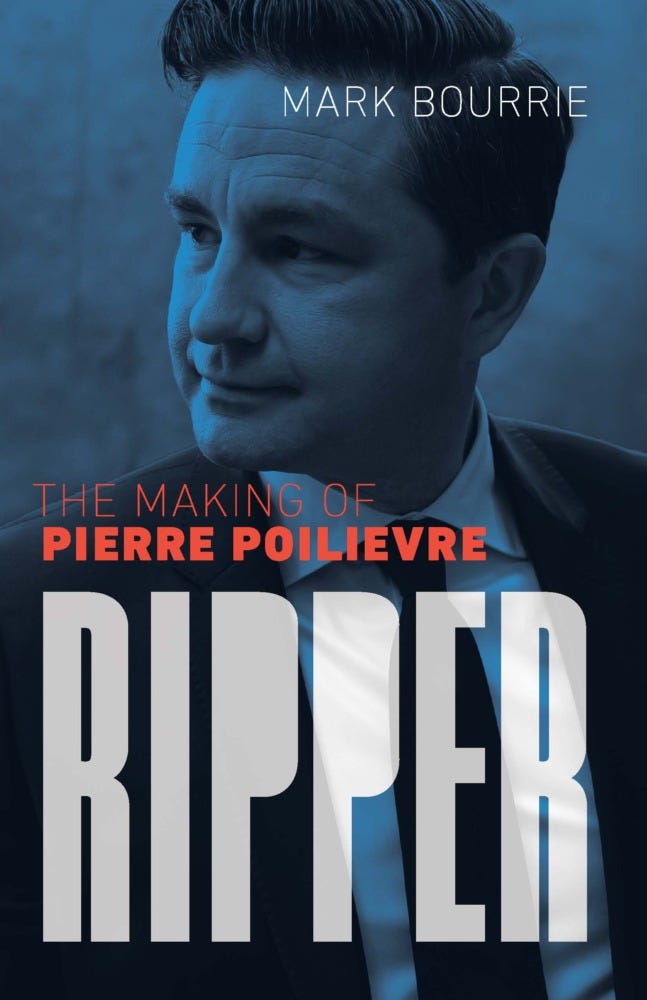Who Is Pierre Poilievre? Author Mark Bourrie On The Man And His Project
In his new book, Bourrie explores the rise of the Conservative leader who was once all but guaranteed to become prime minister – and who may still get there.
By the time Mark Bourrie’s book Ripper: The Making of Pierre Poilievre officially hits the shelves on April 8, Canada will probably be in the midst of a federal election. Copies of the book are already sneaking out of their boxes and onto display tables. If you can get one sooner rather than later, you’ll be doing yourself a favour.
Bourrie has taken the measure of the man who would be prime minister, assessing him and the context in which he’s risen to power. Bourrie writes an honest and comprehensive account of Poilievre’s and offers a look at where he might take the country. The book is no hagiography, but nor is it a hatchet job (a lesser author might have been less disciplined). It’s a fitting, if disconcertin, election primer.
This interview has been edited for length and clarity.
David Moscrop
Let’s start with the title of your book. What's a ripper?
Mark Bourrie
That comes from a column by a conservative columnist in the New York Times who wrote during Covid that there are two types of politicians: weavers and rippers. In his mind, Covid and the pandemic had pushed rippers aside and made politics the venue for weavers. That was actually true for about a week until politicians managed to figure out a way to make Covid and our response to it a wedge issue. I see Pierre Poilievre fitting the description of a ripper in that he managed to leverage our Covid response to push himself forward politically – not just a little bit, but from the middle ranks to the leadership of the Conservative Party.
Moscrop
Is now a good or a bad time for rippers? We may say the pandemic, after a little bit, became a good time for rippers. What about a tariff war with the United States?
Bourrie
That's one of the things that scares me. If someone decides to make the tariff war a cleavage issue and adopts the American point of view, then I think Canada's finished. One of the reassuring things, though, is that so far even politicians who I would never vote for on a bet aren’t doing that. Even Doug Ford, whether he's done the right stuff on tariffs or not, says that he is against the annexation of Canada. And I don't think Trump would actually try to annex Canada unless it was easy, but he's also a politician who scans the whole environment looking for ways of inserting wedges into things and making them issues he can get control of. In that way, he and Poilievre are very similar.
Moscrop
In the book, you write that Poilievre is “Canada's own version of Donald Trump.” What's Trumpian about him?
Bourrie
Well, his use of media that is not really media — or at least not media in the traditional sense. Poilievre gets a lot of mileage from things that look like media but aren't really professional media. He's very good at rallies. He spends a lot of time on the road like Trump. He’s very simplistic in his populism, and very quotable. He really tries to develop a personality following – I hate to use the word cult, but it probably fits. He doesn't show any respect for anybody who has a different opinion or is between him and power. I think that's a real defining part of politics these days, a complete disregard for the humanity of people who have opposing points of view and this belief that if they disagree, they're both wrong and dishonest in some way,
Moscrop
Which explains his attacks on the media.
Bourrie
And a lot of other things he attacks. It explains a lot about how when he's in the West talking about the rest of Canada, he portrays Eastern Canadians in a way that is completely ridiculous to people who actually travel the country. He leverages the whole “Laurentian Consensus” thing – which I think is complete horseshit. I don't buy that at all. It's a nice, very handy stereotype, but like most stereotypes, it falls apart under any kind of serious examination.
Moscrop
Poilievre strikes me as fundamentally ideologically driven – he’s a neoliberal and libertarian in the make of Ayn Rand, Ronald Reagan, and Margaret Thatcher. Is he a true conservative ideologue?



